|
Music Reviews
Alternative
Blues
Books
Christmas
Classic Rock
Country
Jazz
Lounge
Oldies
Power Pop
Punk & New Wave
Reggae
Rhythm & Blues
Seventies
Texas
Special Features
Randy's Rodeo
Sex Pistols
Motown
Halloween
Valentine's Day
Information
About Me
Feedback
Links
User's Guide
Support Me
Amazon
iTunes
Sheet Music Plus
|
Sock it to me, Santa! Visit my other website, www.hipchristmas.com Visit my other website, www.hipchristmas.com
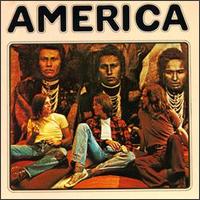 When
America's debut single, "Horse With No Name," stormed the airwaves
in 1972, most listeners thought it was the latest Neil Young record. With it's
insistently strummed acoustic guitars, yearning vocals, and enigmatic lyrics, "Horse
With No Name" was a dead ringer for Young's Harvest-era
folk rock. Sadly, by the time America released the flaccid "Daisy Jane" just
four years later, no one was confusing the band with anything remotely hip. When
America's debut single, "Horse With No Name," stormed the airwaves
in 1972, most listeners thought it was the latest Neil Young record. With it's
insistently strummed acoustic guitars, yearning vocals, and enigmatic lyrics, "Horse
With No Name" was a dead ringer for Young's Harvest-era
folk rock. Sadly, by the time America released the flaccid "Daisy Jane" just
four years later, no one was confusing the band with anything remotely hip.
In the interim, America defined themselves as the quintessential soft rock band,
applying the trappings of hippie culture to conventional commercial pop. While
wags will protest that "soft rock" is an oxymoron, I would argue that,
at the very least, America left
a trail of catchy, memorable singles in their admittedly shallow wake. At their
best, America was capable of genuinely sophisticated, affecting compositions
("I Need You"), and on rare occasions, the band really caught fire
("Sister Golden Hair"). But mainly, they were just a lot of fluffy
fun - which made them a paragon of "Me Decade" virtue.
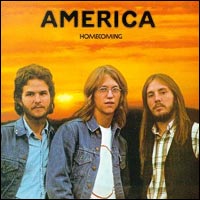 America
is, in many ways, the ideal paradigm of a 70's band. They looked like hippies,
and they paid lip service to the hippie lifestyle, but they were a pop band through
and
through. Early on, America embraced the same stoned mix of ennui and earnestness,
cynicism and sincerity, that made laid-back musicians like the Flying Burrito Brothers,
Eagles, Little Feat, and - not coincidentally - Neil Young, the rock royalty of
the decade. Unlike those bands, however, America quickly began chasing Top 40 airplay
(perhaps stimulated by the overwhelming success of their debut), and their work
careened
swiftly towards the middle of the road. Tellingly, America's vocal harmonies and
relentlessly straight-laced rhythms resembled Crosby Stills & Nash more than
any of the aforementioned bands. Ultimately, America became the same sort of bathetic
self-parody as that storied supergroup - minus the career longevity.... America
is, in many ways, the ideal paradigm of a 70's band. They looked like hippies,
and they paid lip service to the hippie lifestyle, but they were a pop band through
and
through. Early on, America embraced the same stoned mix of ennui and earnestness,
cynicism and sincerity, that made laid-back musicians like the Flying Burrito Brothers,
Eagles, Little Feat, and - not coincidentally - Neil Young, the rock royalty of
the decade. Unlike those bands, however, America quickly began chasing Top 40 airplay
(perhaps stimulated by the overwhelming success of their debut), and their work
careened
swiftly towards the middle of the road. Tellingly, America's vocal harmonies and
relentlessly straight-laced rhythms resembled Crosby Stills & Nash more than
any of the aforementioned bands. Ultimately, America became the same sort of bathetic
self-parody as that storied supergroup - minus the career longevity....
Before that happened, however, America sold a boatload of records. The three Americans
met while attending high school in London, England, and formed the group in 1970.
Two members, Dan Peek and Gerry Beckley, were actually American, and while the third,
Dewey Bunnell, was born English, all three were U.S. Air Force brats. The young group
quickly achieved success, signing to Warner Brothers and recording their self-titled
debut album with veteran British producer Ian Samwell. Released in England near the
end 1971, America and "Horse
With No Name" became a sensation, and it followed suit when released in the
United States early the next year.
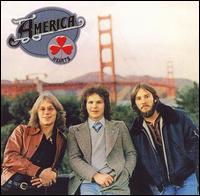 America is
an excellent acoustic rock record, really, lacking much of the unwelcome polish of
the group's later releases. From the opening cut, "Riverside," the band
sounds assured and relaxed, and performances songs like "Sandman" and "I
Need You" indicated that they were no mere Neil Young rip-offs. America stands
today as one of the band's few records worth purchasing on its own. America is
an excellent acoustic rock record, really, lacking much of the unwelcome polish of
the group's later releases. From the opening cut, "Riverside," the band
sounds assured and relaxed, and performances songs like "Sandman" and "I
Need You" indicated that they were no mere Neil Young rip-offs. America stands
today as one of the band's few records worth purchasing on its own.
The non-LP b-side of "Horse With No Name" was
called "Everyone I Meet Is From California," and the group soon made the
predictable move to the Golden State. Their sun-baked, self-produced follow-up, Homecoming (1972),
continued their winning streak both artistically and commercially, spawning several
hits and capping a remarkable year that earned the group a Grammy for "Best
New Artist."
But, Homecoming also
was the first of a string of America albums named with words starting with the letter
H. While the record is one of their best, this annoying habit proved predictive of the
group's increasingly ham-handed stabs at cleverness and significance. Proceeding
from Homecoming's
evocative "Ventura Highway" to Hat
Trick's silly "Muskrat Love" to Holiday's
morose "Lonely People" to Hearts'
awkward "Woman Tonight," America was in rapid decline. Despite collaborating
with legendary Beatles producer George Martin on several albums, the patina of hip
that marked America's early career rusted into a pedestrian stain.
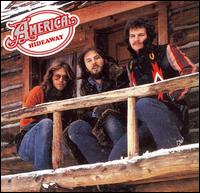 With each release, America became slicker and less consequential till, at last,
they were merely a singles band with an impressive track record. While nearly every
one of their albums has stand-out tracks, the idea that the group had something
meaningful to say became an anachronism from a more innocent age. As the 70's wore
on, audiences became more cynical, hedonistic, and impatient. Disco and punk were
just around the corner, and when the hits slowed down, then stopped, America became
altogether irrelevant - though, eventually, a successful oldies act. With each release, America became slicker and less consequential till, at last,
they were merely a singles band with an impressive track record. While nearly every
one of their albums has stand-out tracks, the idea that the group had something
meaningful to say became an anachronism from a more innocent age. As the 70's wore
on, audiences became more cynical, hedonistic, and impatient. Disco and punk were
just around the corner, and when the hits slowed down, then stopped, America became
altogether irrelevant - though, eventually, a successful oldies act.
Hideaway (1976)
was mildly successful, spawning the pleasant Top 30 single "Today's The Day," but
the group foundered with Harbor (1977),
their last Martin-produced record. Subsequently, Dan Peek left to pursue a solo
career in Christian music, leaving Bunnell and Beckley to soldier on as a duo beginning
with America/Live,
the group's last record for their longtime label Warner Brothers. Though a few
more hits would trickle down, America spent the rest of the century in relative
anonymity, remembered mainly as the group who sang that song about "plants
and birds and rocks and things."
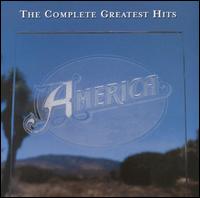 But, Bunnell and Beckley did, indeed, carry on. Switching to a new label (Capitol),
America released a string of slick, pop-oriented albums that, for the most part,
foundered in the lower reaches of the charts. At the very least, the group dropped
their silly alliterative title conceit, though wags will note that their first
Capitol LP was called Silent
Letter (get it?). In 1982, the duo scored their last major hit with "You
Can Do Magic," a Top 10 single written and (slickly) produced by Russ Ballard of Argent. After being dropped by Capitol following America
In Concert (1985), the group toured consistently and recorded sporadically
over the next two decades. But, Bunnell and Beckley did, indeed, carry on. Switching to a new label (Capitol),
America released a string of slick, pop-oriented albums that, for the most part,
foundered in the lower reaches of the charts. At the very least, the group dropped
their silly alliterative title conceit, though wags will note that their first
Capitol LP was called Silent
Letter (get it?). In 1982, the duo scored their last major hit with "You
Can Do Magic," a Top 10 single written and (slickly) produced by Russ Ballard of Argent. After being dropped by Capitol following America
In Concert (1985), the group toured consistently and recorded sporadically
over the next two decades.
All of America's Warner Brothers and Capitol albums have been reissued
on compact disc, though some have since fallen out-of-print. But, the knee-jerk
choice among baby boomers collecting America's multitudinous hits is History:
America's Greatest Hits (1975), an enormously popular record in its day. Much
later, Rhino Records followed that with Encore!
More Greatest Hits (1990), culling later Warners tracks along with the best
of the Capitol years - all vastly inferior to the group's early material.
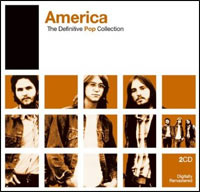 Comparitively,
Rhino's Complete
Greatest Hits (2001) was a welcome addition to the group's catalog - complete,
yet concise. And, it's superior in every way to the old Greatest
Hits sets: sound quality, chronological span, track selection, packaging. Personally,
I would have attended a little closer to the early years ("Riverside," for
instance, is missing) by dropping the two pointless new tracks, but it's a solid
purchase, nonetheless. For the diehard fan, America compiled a 4-disc boxed set, Highway:
30 Years Of America (2000). The box (also on Rhino) is very well constructed,
but, to my taste, it runs at least two discs past its welcome. Comparitively,
Rhino's Complete
Greatest Hits (2001) was a welcome addition to the group's catalog - complete,
yet concise. And, it's superior in every way to the old Greatest
Hits sets: sound quality, chronological span, track selection, packaging. Personally,
I would have attended a little closer to the early years ("Riverside," for
instance, is missing) by dropping the two pointless new tracks, but it's a solid
purchase, nonetheless. For the diehard fan, America compiled a 4-disc boxed set, Highway:
30 Years Of America (2000). The box (also on Rhino) is very well constructed,
but, to my taste, it runs at least two discs past its welcome.
Imagine my delight, then, when Rhino later issued The
Definitive Pop Collection (2006), a 2-disc, 30-track survey restricted to
America's Warner Brothers recordings. Stopping abruptly after
Harbor (1977),
Definitive
Pop Collection lops off a few later hits like "You Can
Do Magic" (along with a load of drippy dreck), but it picks up a number
of minor singles and worthwhile album cuts (including "Riverside"). Consequently, the
album's overall quality is buoyed by its limited scope, making The
Definitive Pop Collection exactly what it claims to be. [top of page]
 Selected America Albums Selected America Albums
[top of page]
 Essential America Songs Essential America Songs
- Amber Cascades (1976)
- Daisy Jane (1975)
-
Don't Cross the River (1972)
-
Everyone I Meet Is from California (1971)
- God Of The Sun (1977)
- Horse With No Name (1971)
-
I Need You (1971)
-
Lonely People (1974)
-
Muskrat Love (1973)
- Old Man Took (1974)
-
Only in Your Heart (1972)
-
Riverside (1971)
-
Sandman (1971)
- She's Gonna Let You Down (1973)
-
Sister Golden Hair (1975)
-
Tin Man (1974)
-
Today's the Day (1976)
-
Ventura Highway (1972)
[top of page]
 America On The Web America On The Web
[top of page]
 Feedback Feedback
Your witty comments, impertinent questions, helpful suggestions, and angry denials
are altogether encouraged. Submit feedback via email;
submissions will be edited and posted at my discretion.
|
|